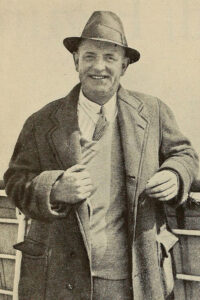
The Little Nugget
Philosophers among them would possibly have meditated on the limitations of human effort, for they had done their best for Mrs Ford. They had housed her well. They had fed her well. They had inspired servants to anticipate her every need. Yet here she was, amid all these aids to a contented mind, exhibiting a restlessness and impatience of her surroundings that would have been noticeable in a caged tigress or a prisoner of the Bastille. She paced the room. She sat down, picked up a novel, dropped it, and, rising, resumed her patrol. The clock struck, and she compared it with her watch, which she had consulted two minutes before. She opened the locket that hung by a gold chain from her neck, looked at its contents, and sighed. Finally, going quickly into the bedroom, she took a framed oil painting from a suitcase and, returning with it to the sitting room, placed it on a chair and stepped back, gazing at it hungrily. Her large brown eyes, usually complex and imperious, were strangely softened. Her mouth quivered.
‘Ogden!’ she whispered.
The picture that had inspired this exhibition of feeling would probably not have affected the casual spectator to quite the same degree. He would have seen merely a very faulty and amateurish portrait of a singularly repellent little boy of about eleven, who stared out from the canvas with an expression half stolid, half querulous; a bulgy, overfed little boy; a little boy who looked exactly what he was, the spoiled child of parents who had far more money than was good for them.
As Mrs Ford gazed at the picture and the picture stared back at her, the telephone bell rang. She ran to it eagerly. It was the hotel’s office announcing a caller.
‘Yes? Yes? Who?’ Her voice fell as if the name was not the one she had expected. ‘Oh, yes,’ she said. ‘Yes, please ask Lord Mountry to come to me here.’
She returned to the portrait. The look of impatience that had left her face as the bell sounded was back now. She suppressed it with an effort as her visitor entered.
Lord Mountry was a blond, pink-faced, fair-moustached young man of about twenty-eight—a thick-set, solemn young man. He winced as he caught sight of the picture, which immediately fixed him with a stony eye on his entry and quickly looked away.
Read or download Book
Pelham Grenville Wodehouse
Sir Pelham Grenville Wodehouse, KBE (15 October 1881 – 14 February 1975) was an English writer and one of the most widely read humorists of the 20th century.
Biography.
His creations include the feather-brained Bertie Wooster and his sagacious valet, Jeeves; the immaculate and loquacious Psmith; Lord Emsworth and the Blandings Castle set; the Oldest Member, with golf stories; and Mr Mulliner, with tall tales on subjects ranging from bibulous bishops to megalomaniac movie moguls.
Born in Guildford, the third son of a British magistrate based in Hong Kong, Wodehouse spent happy teenage years at Dulwich College, to which he remained devoted all his life. After leaving school, he was employed by a bank but disliked the work and turned to writing in his spare time. His early novels were mostly school stories, but he later switched to comic fiction. Most of Wodehouse’s fiction is set in his native United Kingdom, although he spent much of his life in the US and used New York and Hollywood as settings for some of his novels and short stories. He wrote a series of Broadway musical comedies during and after the First World War, together with Guy Bolton and Jerome Kern, that played an essential part in the development of the American musical. He began the 1930s writing for MGM in Hollywood. In a 1931 interview, his naive revelations of incompetence and extravagance in the studios caused a furore. In the same decade, his literary career reached a new peak.
In 1934, Wodehouse moved to France for tax reasons; in 1940, he was taken prisoner at Le Touquet by the invading Germans and interned for nearly a year. After his release, he made six broadcasts from German radio in Berlin to the US, which had not yet entered the war. The talks were comic and apolitical, but his broadcasting over enemy radio prompted anger and strident controversy in Britain and a threat of prosecution. Wodehouse never returned to England. He lived in the US from 1947 until his death, taking dual British-American citizenship in 1955. He died in 1975, at 93, in Southampton, New York, one month after he was awarded a knighthood of the Order of the British Empire (KBE).
Wodehouse was a prolific writer, publishing over ninety books, forty plays, two hundred short stories, and other writings between 1902 and 1974. He worked extensively on his books, sometimes having two or more in preparation simultaneously. He would take up to two years to build a plot and write a scenario of about thirty thousand words. After the scenario was complete, he would write the story. Early in his career, Wodehouse would produce a novel in about three months, but he slowed to around six months in old age. He used a mixture of Edwardian slang, quotations from and allusions to numerous poets, and several literary techniques to produce a prose style that has been compared to comic poetry and musical comedy. Some critics of Wodehouse have considered his work flippant, but among his fans are former British prime ministers and many of his fellow writers.






